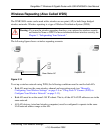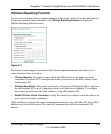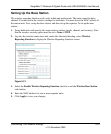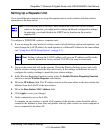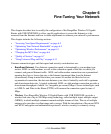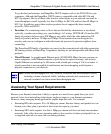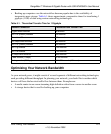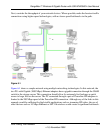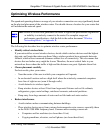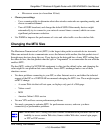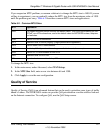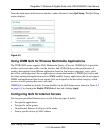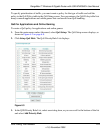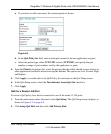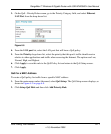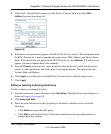
RangeMax™ Wireless-N Gigabit Router with USB WNR3500L User Manual
Fine-Tuning Your Network 6-5
v1.0, November 2009
Optimizing Wireless Performance
The speed and operating distance or range of your wireless connection can vary significantly based
on the physical placement of the wireless router. You should choose a location for your router that
will maximize the network speed.
The following list describes how to optimize wireless router performance.
• Identify critical wireless links.
If your network has several wireless devices, decide which wireless devices need the highest
data rate, and locate the router near them. Many wireless products have automatic data-rate
fallback, which allows increased distances without loss of connectivity. This also means that
devices that are farther away might be slower. Therefore, the most critical links in your
network are those where the traffic is high and the distances are great. Optimize those first.
• Choose placement carefully.
For best results, place your router:
– Near the center of the area in which your computers will operate.
– In an elevated location such as a high shelf where the wirelessly connected computers
have line-of-sight access (even if through walls).
– Avoid obstacles to wireless signals.
– Keep wireless devices at least 2 feet from large metal fixtures such as file cabinets,
refrigerators, pipes, metal ceilings, reinforced concrete, and metal partitions.
– Keep away from large amounts of water such as fish tanks and water coolers.
• Reduce interference.
– Avoid windows unless communicating between buildings.
– Place wireless devices away from various electromagnetic noise sources, especially those
in the 2400–2500 MHz frequency band. Common noise-creating sources are:
• Computers and fax machines (no closer than 1 foot)
• Copying machines, elevators, and cell phones (no closer than 6 feet)
Note: Failure to follow these guidelines can result in significant performance degradation
or inability to wirelessly connect to the router. For complete range and
performance specifications, click the link to the online document “Wireless
Networking Basics” in Appendix B.



